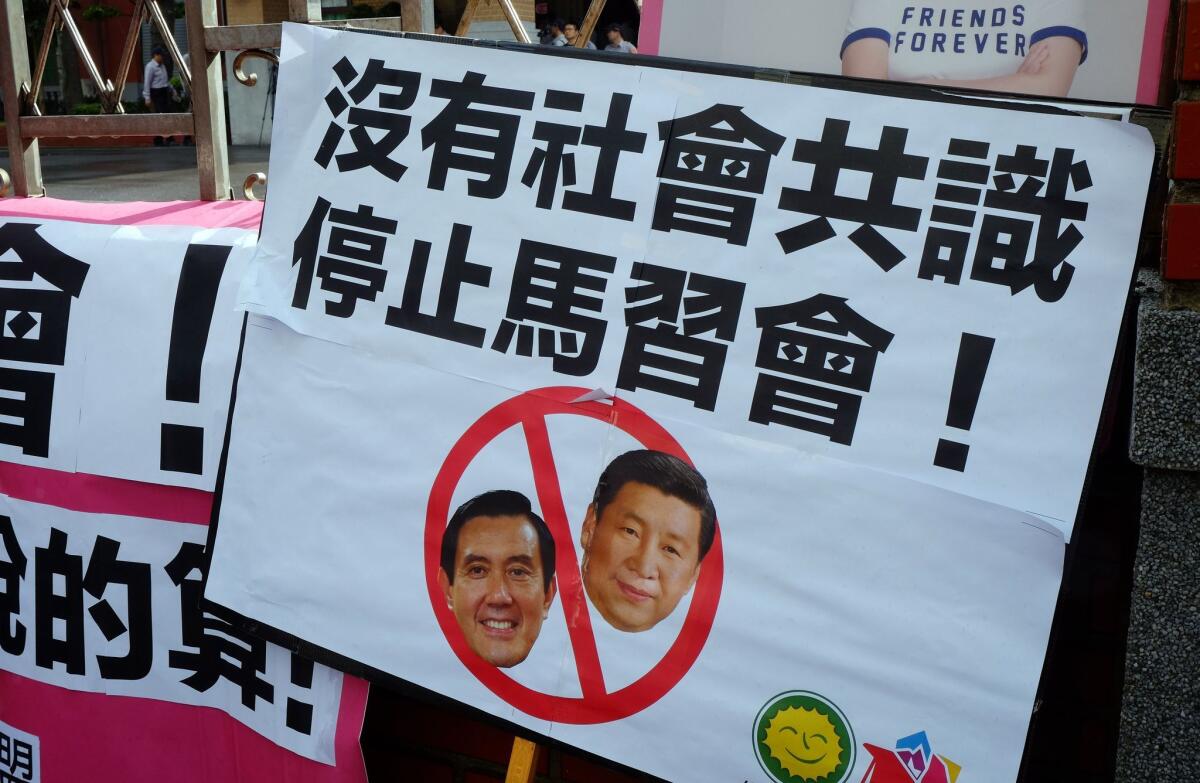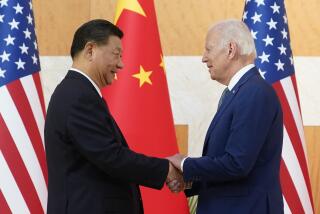Taiwan’s top opposition party criticizes planned meeting with China’s president

A placard against the meeting between Taiwan’s President Ma Ying-jeou and his Chinese counterpart Xi Jinping is placed at the main entrance during a demonstration outside the parliament in Taipei.
- Share via
reporting from Beijing — Taiwan’s leading opposition party on Wednesday sharply criticized plans for President Ma Ying-jeou to meet Chinese leader Xi Jinping this weekend, calling the encounter an attempt to manipulate upcoming elections on the island.
“President Ma promised when he was reelected [in 2012] that he would not meet with Chinese leaders within four years. But now, he has arranged this kind of sudden meeting, and we ask him to give some answers,” Democratic Progressive Party spokesman Cheng Yun-peng said in a scathing statement.
“What kind of meeting this is? What’s the purpose? Why has he rushed to meet with Xi at this time? How did he negotiate with the Chinese? What form of meeting will take place? What are the arrangements? What will he say and what will he do?”
The Democratic Progressive Party, or DPP, complained that the sudden announcement of the meeting late Tuesday was yet another example of how Ma’s Nationalist Party administration “operates in a black box.”
“Right now, Taiwan is going through a new round of elections and President Ma decided to hold the meeting at this sensitive time,” Cheng added. “We can’t help but think this is a kind of political move with the purpose of influencing the election.”
Taiwan has had de facto independence from mainland China since 1949, when Gen. Chiang Kai-shek’s Nationalist Party forces were defeated in a civil war by Mao Tse-tung’s Communist troops and fled to the island 100 miles off the mainland’s southeastern coast.
For decades, the Nationalist Party in Taipei asserted that it was the rightful ruler over all of China, while the mainland’s Communist government has always regarded Taiwan as a renegade part of China that must eventually be brought under Beijing’s control, by force if necessary.
The top leaders from each side have never met face to face since the split, though in 2005 then-Chinese President Hu Jintao met the chairman of the Nationalist Party; at the time, the DPP, not the Nationalists, held Taiwan’s presidency.
NEWSLETTER: Get the day’s top headlines from Times Editor Davan Maharaj >>
In recent years, under Ma’s Nationalist administration, the two sides have established direct flights across the Taiwan Strait and developed strong economic ties, but have remained at loggerheads over Taiwan’s status. In the last year, a backlash has mounted in Taiwan against Ma’s pursuit of closer ties with the mainland.
Saturday’s unprecedented meeting is set to take place just two months before January polls in which the Nationalists are widely expected to go down to defeat. Democratic Progressive Party candidate Tsai Ing-wen has been ahead in public opinion polls for months, with the Nationalists running a disorganized campaign and recently replacing candidate Hung Hsiu-chu, a teacher-turned-legislator who was drawing as little as 13% support. The Nationalists may also lose control of parliament for the first time in history.
That has worried Beijing, which regards the DPP as a “pro-independence” party.
Ma, who is finishing his second term, cannot seek another reelection.
Why Xi and Ma have decided to meet now is a subject of great speculation. John D. Ciorciari, a China scholar at the University of Michigan, said the two may have decided to meet because both sides expect Tsai to win the election.
“That makes leaders’ meetings unlikely in the years ahead, so if Xi wants to set a precedent for them in the near term, he needs to do it now,” he said. “The Xi-Ma meeting isn’t likely to produce major deliverables, because neither president wants to see a DPP landslide in the legislature or drive Taiwanese voters much further away, but Xi and Ma both appear to see longer-term advantages of breaking the ice on direct engagement by leaders.”
The protocol of the meeting will be delicate. Mainland officials said Xi and Ma would not address each other as “president” but as “Mr. Ma” and “Mr. Xi.”
Zhang Zhijun, Beijing’s top official for Taiwan affairs, described the planned meeting as a “milestone” that would show the spirit of shelving differences while respecting each other, the mainland’s official New China News Agency reported Wednesday.
Xi and Ma are expected to meet Saturday afternoon, hold separate news conferences, and then eat dinner together.
The DPP called on Ma as “head of state, to maintain his integrity with his actions and words.”
The party said he ought to “demonstrate that he is representing the sovereignty and national dignity … and not hurt our national dignity and our value of democracy and freedom.”
Both Beijing and Taipei have downplayed expectations for any agreements or other “deliverables” from the meeting.
Tommy Yang in the Times’ Beijing bureau contributed to this report.
ALSO
Appeal of Oscar Pistorius’ murder acquittal centers on intent to kill
In Russia, conflicting theories over passenger jet crash in Sinai
Pentagon suspends troubled missile defense system at center of ‘runaway blimp’
More to Read
Sign up for Essential California
The most important California stories and recommendations in your inbox every morning.
You may occasionally receive promotional content from the Los Angeles Times.














